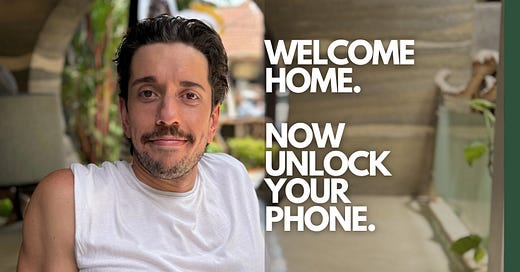Welcome Home, Now Unlock Your Phone.
How to Avoid Digital Strip Searches When Reentering the U.S. Without Losing Your Privacy
There are a lot of indignities that come with flying international: the 3 a.m. body-clock meltdown, the middle seat between two people who just met and are now trauma-bonded for life, the $12 can of Pringles from the JFK Hudson News.
But nothing hits quite like getting to the U.S. border and having a federal agent say: “Can you unlock your phone for us?”
No warrant. No warning. Just your digital life laid bare, every text, every photo, every weird Reddit tab you forgot to close.
This is legal. It happens all the time. And it doesn’t just happen to people doing something sketchy. It happens to journalists. Lawyers. Students. Tech workers. Regular people with bad passwords and good gossip.
So let’s fix that. Not the system (yet), but at least your vulnerability to it.
Today’s post is your no-BS, zero-jargon guide to protecting your phone and your data when flying into the U.S.
Especially if you’re coming back from abroad and don’t want to hand over your encrypted iCloud nightmares to a guy with a badge and an iPhone cloning device.
Let’s talk prep, strategy, and digital hygiene, because TSA might not care about your burner email, but CBP absolutely does.
🧠 Why This Matters (Even If You’re a Law-Abiding Citizen™️)
CBP can search your phone without a warrant at the border. It’s called the “border search exception,” and it’s been legally upheld.
They can take your phone, clone it, and hold it for weeks. Especially if you don’t unlock it.
U.S. citizens are not exempt. There are different rules for non-citizens (often harsher), but citizens still have limited rights in this zone.
They use tools like Cellebrite and GrayKey. These tools extract everything: messages, photos, app data, even deleted stuff, depending on the model and OS.
👀 If your phone holds sensitive info about your work, your identity, your ex, your notes app poetry, this affects you.
🔒 Pre-Flight Digital Hygiene Checklist
Want to avoid getting your phone cloned by border agents? Here’s how to reduce the risk.

1. Clean House Before You Fly
Treat your phone like it’s going through TSA. If you don’t want it seen, remove it.
Delete any highly personal or sensitive content and remember to clear it from any recently deleted sections. (messages, photos, files).
Clear your browsing history and cached data in Safari & Chrome (yes, even incognito counts).
Log out of apps or delete them temporarily, especially encrypted messengers (Signal, Telegram) if you’re worried they might flag interest.
Keep your phone in Airplane mode when going through customs! (CBP clarified that its policy allowing warrantless border searches is restricted to locally stored data only)
💡 Pro move: Back up your important data elsewhere (encrypted cloud or hard drive), then travel with a cleaner version of your phone.
2. Enable Full Device Encryption
Most modern smartphones are encrypted by default. Just make sure:
You’re using a strong passcode (6+ digits or alphanumeric, not just FaceID or fingerprint).
Your phone is fully shut down before entering customs. Why? Some tools can extract data more easily from a powered-on phone.
3. Disable Cloud Backups
Cloud backups are a weak link. They can be accessed by the company that stores them, so even if your messages are encrypted on your phone, your iCloud backup might not be.
If you’re using an iPhone, consider enabling Advanced Data Protection from Apple. Honestly this is an incredible feature and you should have it on regardless of travel
Turn off iCloud or Google Drive backup for messages, photos, and notes.
Store critical info in apps with local-only encryption (like Signal or ProtonDrive).
4. Use a Travel Device (If You’re Hardcore)
This is tinfoil-hat adjacent, but if you’re traveling with sensitive data, journalists, lawyers, anyone with a high threat model, use a clean device:
Cheap burner smartphone with minimal apps and only the essentials.
Log in only to what you need while traveling.
Keep your main device at home or stored securely.
😬 Section 3: What If They Ask to Search Your Device?
First off: stay calm. This is a legal gray zone, and being polite matters more than being right in this moment.
U.S. citizens cannot be denied entry, even if they refuse to unlock their phone. But your phone can be held or sent to forensics.
You do not have to give up passwords. CBP can ask, but you can decline, just know it may trigger delays or phone seizure.
You can ask to speak to a supervisor or have legal counsel, especially if the search seems extensive.
📌 The Electronic Frontier Foundation (EFF) has a printable “travel privacy” guide you can bring with you. Highly recommended if you’re nervous or traveling with confidential info.
✈️ Section 4: Digital Minimalism at the Border
Sometimes the best defense is… not bringing anything they’d want to search.
Here’s what not to bring across a border if you can avoid it:
Highly personal conversations or photos (especially from secure messaging apps like Signal, as mentioned in my article in late March).
Work data that isn’t public-facing.
Confidential client or legal files.
Notes to self like “Substack Draft about breaking up with capitalism” 😬
📬 Final Thoughts (And a Tiny Existential Crisis)
Our phones are not just tools. They are mirrors, diaries, therapists, and archives. And we’re handing them to the state without thinking twice.
Until laws catch up to reality (shoutout to the ACLU, and EFF doing the hard work), the best protection is being intentional. You don’t need to be a conspiracy theorist to want privacy. You just need to be a person with a phone.





This is GREAT information - and not just for traveling!